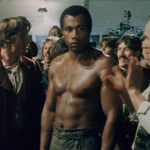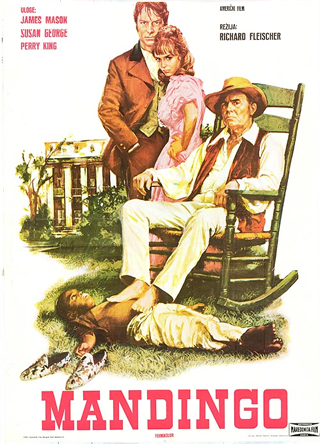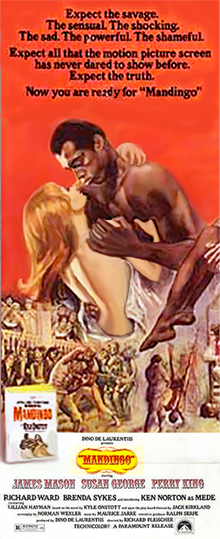 This is gonna be an awkward conversation starter, but, uh… anybody here seen MANDINGO? It’s a deeply uncomfortable, ugly movie, not just in showing horrible things, but in making us follow main characters who don’t see anything wrong here. Directed by Richard Fleischer (20,000 LEAGUES UNDER THE SEA, MR. MAJESTYK, CONAN THE DESTROYER) and written by mentally ill two-time Academy Award nominee Norman Wexler, it was maybe intended as a prestige picture but received as trash and exploitation. I don’t care which it is but I do think it’s pretty brilliant, even STARSHIP TROOPERSy, in the way it confronts racism, so I thought it would be worth discussing before DJANGO UNCHAINED comes out.
This is gonna be an awkward conversation starter, but, uh… anybody here seen MANDINGO? It’s a deeply uncomfortable, ugly movie, not just in showing horrible things, but in making us follow main characters who don’t see anything wrong here. Directed by Richard Fleischer (20,000 LEAGUES UNDER THE SEA, MR. MAJESTYK, CONAN THE DESTROYER) and written by mentally ill two-time Academy Award nominee Norman Wexler, it was maybe intended as a prestige picture but received as trash and exploitation. I don’t care which it is but I do think it’s pretty brilliant, even STARSHIP TROOPERSy, in the way it confronts racism, so I thought it would be worth discussing before DJANGO UNCHAINED comes out.
 The reason it was controversial is it’s a period drama, and the period is the slavery era. So all kinds of degrading treatment and talk is on screen, and the white actors get to dress up fancy while the black actors bring them food or hang upside down naked. That makes it hard to stomach, but what is the alternative? To not make any movies depicting this 400 year period of our history, because it was horrible? That seems awfully convenient for us white people. “You know what, let’s forget slavery ever happened. It’s too degrading.” Plus, the movie deals heavily with white people making their slaves have sex with them, which was a major part of the advertising campaign. I think the main buttons it pushed back then were lingering prejudice against inter-racial relationships, white fears about penis size and just old fashioned sexual prudishness, because there are butts and boobs involved. But you don’t need all that for it to be upsetting because of the whole rape part of it. I gotta say, I do not agree with the decision to promote this as a steamy sex movie.
The reason it was controversial is it’s a period drama, and the period is the slavery era. So all kinds of degrading treatment and talk is on screen, and the white actors get to dress up fancy while the black actors bring them food or hang upside down naked. That makes it hard to stomach, but what is the alternative? To not make any movies depicting this 400 year period of our history, because it was horrible? That seems awfully convenient for us white people. “You know what, let’s forget slavery ever happened. It’s too degrading.” Plus, the movie deals heavily with white people making their slaves have sex with them, which was a major part of the advertising campaign. I think the main buttons it pushed back then were lingering prejudice against inter-racial relationships, white fears about penis size and just old fashioned sexual prudishness, because there are butts and boobs involved. But you don’t need all that for it to be upsetting because of the whole rape part of it. I gotta say, I do not agree with the decision to promote this as a steamy sex movie.
It’s the story of a rich white (duh) family on a plantation called Falconhurst (I really thought they said Falcon Crest, which made me want to rethink that old TV show). The crotchety dad (James Mason) is on his way out and his handsome son Hammond (Perry King from CLASS OF 1984) wants to run the place his own way. I think he thinks he’s a little enlightened and sensitive because he finds out his cousin whips the slave that he makes have sex with him. He thinks that’s sick, he tries to be gentle with his “wench,” even tells her to look him in the eye. And he sweet talks her with sincere promises like “I won’t sell you.”
It’s all about hypocrisy. He thinks he’s a nice white man, but doesn’t bat an eye at the horrible shit around him: little boys fanning the family and guests off while they eat, dad sleeping and sitting with a little boy pressed against his feet to cure his rheumatism. In fact, not to cure it, to transfer it into the kid! He also tends to blow his top ranting about abolitionists – I mean, who the hell is he gonna keep his feet on if those guys have their way? I don’t know if this comes from the play and book it’s based on or from the crazy screenwriter, but they do a good job of not just showing you the standard slavery imagery, going further into the sicko details so it will hit you in the balls. Guys checking asses for hemhorrhoids, selling slaves at the same place they sell mules, boiling a slave in brine to toughen him up for fights.
That’s Mede (WBC heavyweight champion boxer Ken Norton, a couple years after breaking Ali’s jaw), and when Hammond buys him he has to outbid a German lady who casually reaches into Mede’s pants to check his dick size. And he just stands there like it’s normal. Hammond gets him though, and he’s so proud, like he bought a sports car or something. Or maybe like a show horse or something because he carries “the papers” around in his shirt pocket to show off that Mede is “pure.”

The diabolical genius of the movie is how clueless Hammond is about being despicable. He thinks he’s the hero in a romance and the movie plays along. He marries his cousin (Susan George), then when he thinks she’s not a virgin he completely loses interest in her and treats her like shit. At the same time he has no idea why she’s mad about him spending time with his “wench” Ellen (Brenda Sykes, wife of Gil-Scott Heron and co-star of CLEOPATRA JONES). When his wife does the exact same thing with Mede to get back at him he thinks both of them have wronged him and must be killed.
In a sense this plays like a parody of GONE WITH THE WIND or SONG OF THE SOUTH. I know those both take place after slavery, but they have this romanticized view of the people responsible for it and the former slaves who still work for their families. MANDINGO puts the lie to the notion of the not-that-bad slave owner.
There’s a subplot about putting Mede in organized fights against other slaves. They’ve got these poor guys savagely beating the hell out of each other, all for the benefit of their owners. You can’t help but notice a parallel with a boxer-trainer or boxer-promoter relationship, and it seems to be somewhat of a commentary on this. But the unspoken abuses there pale compared to the ones in his relationships with his female slaves.
To me, the bit of cluelessness that is most classic Hammond is when one of his slaves, Pearl (Reda Wyatt), gives birth to Mede’s baby (or “sucker” as they always call them in this movie) and he acts like it’s his big day. He excitedly takes the baby from the mother and runs away, glowing about his achievement. Pure Mandingo, too, good for fighting! I’m not sure most people would even do that to a dog that just had puppies.
He’s equally heartless when he gets Ellen pregnant with his own baby. He gets enraged when she tries to convince him to let the child be free. But when he calms down he sweetly says, “All right. If it means that much to you.” Just agreeing to it to be nice to her.
His wife Blanche at times seems like a victim in this, but when she finds out about Ellen she beats her and throws her down some stairs so the baby is miscarried. Don’t worry, Romeo is on the case: “It don’t matter,” he says reassuringly. I think he believes that Ellen is upset because she’s worried about his disappointment, and that everything will be okay if he just tells her he doesn’t care about the dead baby.
After all this it’s frustrating that (SPOILER) the slaves don’t get their revenge. I really thought they would. Mede is a bad ass fighter, and the title refers to his heritage, and he even has a learning experience when the defiant slave Cicero (Ji-Tu Cumbuka) tries to escape. Mede catches the fugitive for his master, then thinks better of it and lets him go, but it’s too late, he delayed him too long to get away. Cicero shames Mede for it as they hang him. Also he calls them peckerwoods and tells them to kiss his ass after he’s dead.
I hoped Mede was destined to learn from this and take on the role of a new and more successful Cicero, but… not really. This is Extreme White People’s Problems. It pretends that it’s about the petty bullshit in this family’s lives, when clearly it’s really about the horrors their lifestyle is causing. And they never even notice, never see Mede’s humanity at all. They’re too self-absorbed.
The lesson is, being acceptable to society doesn’t necessarily equal being right. Today, it’s hard to imagine we could commit any crimes as heinous as slavery, but that doesn’t mean we’re innocent. We oughta be real sure that we’re as nice as we think we are, and real careful about who we put our feet on.


























December 18th, 2012 at 2:22 pm
I’ve heard a lot about MANDINGO over the years, but I’ve never felt the need to see it. Slavery, be it the old fashioned way depicted in this movie or the more modern variant where people work 16 hour shifts in some sweat shop in the slum, is something we have to figth to get rid of, not make entertainment out of.